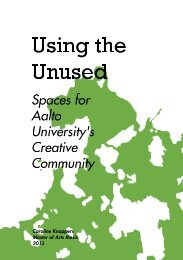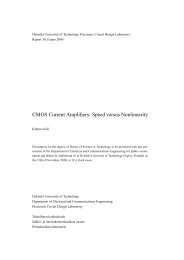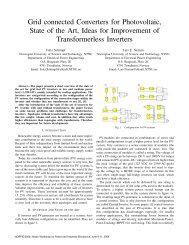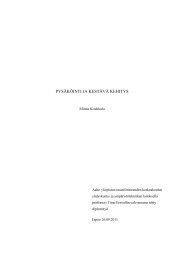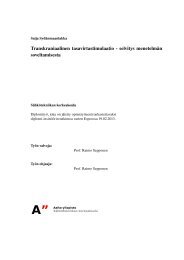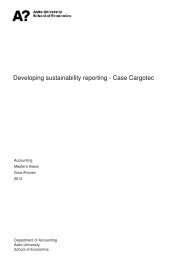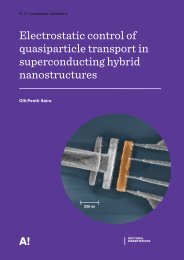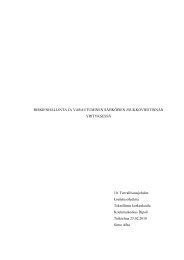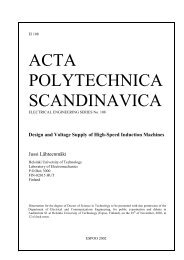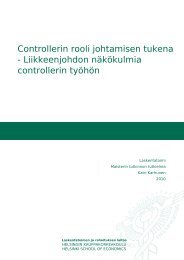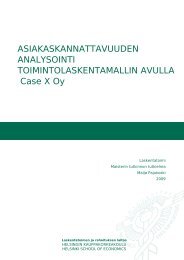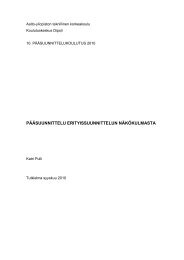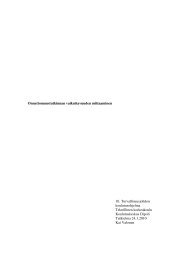A Feasibility Study - Aaltodoc - Aalto-yliopisto
A Feasibility Study - Aaltodoc - Aalto-yliopisto
A Feasibility Study - Aaltodoc - Aalto-yliopisto
Create successful ePaper yourself
Turn your PDF publications into a flip-book with our unique Google optimized e-Paper software.
11 Conclusion<br />
This thesis presented the <strong>Aalto</strong>RO concept – a wave powered reverse osmosis<br />
desalination system – for the production of fresh water from seawater. At present there<br />
are over 700 million people suffering from water scarcity and the number is estimated to<br />
grow significantly in the future. Fossil fuel reserves are also diminishing, so the need to<br />
produce more fresh water without using fossil fuels is urgent.<br />
The first part of this thesis consisted of a Literature Review, which comprised of a<br />
market study to investigate which areas of the world would be suitable for the <strong>Aalto</strong>RO<br />
system, and of a section presenting the major desalination technologies and markets.<br />
The second part of the thesis consisted of a <strong>Feasibility</strong> <strong>Study</strong>, in which the goal was to<br />
determine would <strong>Aalto</strong>RO be economically feasible and on what terms.<br />
The market research of the Literature Review examined the world according to three<br />
parameters: the wave energy resource, the need for fresh water and the cost of<br />
electricity. If an area met all three of the criteria, it was considered a potential location<br />
for the <strong>Aalto</strong>RO system. The research revealed six suitable areas: Australia, the Canary<br />
Islands, Chile, Hawaii, South Africa and the western parts of the United States.<br />
The <strong>Feasibility</strong> <strong>Study</strong> consisted of a detailed description of the <strong>Aalto</strong>RO system and of a<br />
case study, which examined the economic feasibility of <strong>Aalto</strong>RO in four areas. First, the<br />
optimum pressure level for the operation was determined on Site 1 and found to be 45<br />
bar. Second, the permeate production on each Site was calculated according to the wave<br />
data supplied by AW-Energy. Third, by estimating the capital and operational costs of<br />
the system and by applying the annuity method, the cost of water was calculated.<br />
The results of the <strong>Feasibility</strong> <strong>Study</strong> demonstrated that as the wave power level increases<br />
the cost of the produced water decreases. This is evident from the fact that on Site 2,<br />
(wave power 9,5 kW/m), the minimum cost of water was 1,5 €/m³ and on Site 4, (38<br />
kW/m), the minimum cost of water was 0,60 €/m³. However, the cost of water is highly<br />
susceptible to the nature of the wave power, which was illustrated when the minimum<br />
cost of water from Site 1 (15 kW/m) was 0,76 €/m³ while Site 3 (16 kW/m) produced<br />
water with a minimum cost of 1,02 €/ m³.<br />
In order to determine, if the water produced with <strong>Aalto</strong>RO is on a suitable level, it was<br />
compared with cost details from other sources. On the largest SWRO plant in the world,<br />
the Hadera in Israel, the cost of water is 0,49 €/m³. A research group in the Queen’s<br />
University Belfast have also studied wave powered desalination and estimated the cost<br />
to be 0,56 €/m³. Compared with these figures, <strong>Aalto</strong>RO seems economically feasible.<br />
The production of fresh water by reverse osmosis using the renewable energy of the<br />
seas is a viable option and could be a significant source of drinking water, which is not<br />
dependent on diminishing fossil fuels. There are still many hurdles to overcome, but all<br />
in all this thesis has proved that wave powered desalination is an economically viable<br />
option and that it could provide more fresh water to a world desperately craving for it.<br />
75




